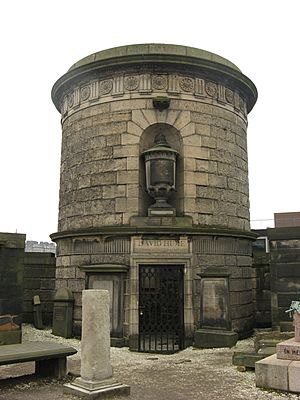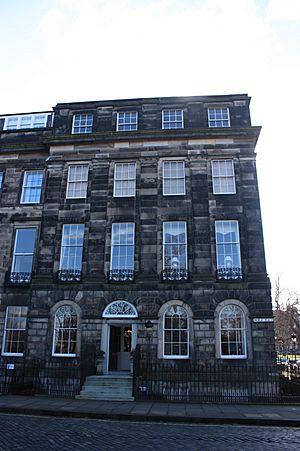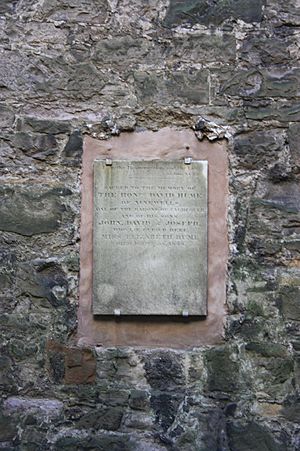David Hume (advocate) facts for kids

David Hume, Baron Hume of Ninewells (1757–1838) was an important Scottish lawyer, judge, and expert in law. His work on Scottish criminal law and private law is still very important today. People call him Baron Hume to make sure they don't confuse him with his famous uncle, David Hume the philosopher.
Hume studied at the Universities of Glasgow and Edinburgh. He became a lawyer in 1779. In 1786, he became a Professor of Scottish Law at the University of Edinburgh. He kept this job until 1822. Then, he became a judge called a Baron of Exchequer. In 1785, he married Jane Alder. They had three sons and three daughters.
Hume wrote a very important book about criminal law. It was called Commentaries on the Law of Scotland, Respecting Trial for Crimes (1797). This book is still used in courts even now. He also gave lectures on private law, but he didn't publish them during his life. However, copies of his notes were shared widely. They were so good that judges sometimes used them in court. Later, his lectures were finally published between 1939 and 1958. This made his ideas important again, especially for property law.
Early Life and School
David Hume was born on February 27, 1757, in Chirnside, Berwickshire, Scotland. His parents were John Hume of Ninewells and Agnes Carre. He was the nephew of the famous philosopher, David Hume.
From 1765 to 1767, David went to Edinburgh high school. After that, he studied at the University of Edinburgh. In 1774, he learned about Roman Law there. In 1775, he became a law student at the University of Glasgow. He stayed there until 1777. During this time, he lived with Professor John Millar. Professor Millar was known as the best law teacher in Britain back then. In 1777 and 1778, Hume also studied Scottish law in Edinburgh.
His Career as a Lawyer and Judge
Hume became a member of the Faculty of Advocates in 1779. This meant he could work as a lawyer. In 1783, he was chosen to be a part-time sheriff-depute for Berwickshire. A sheriff-depute was a local judge. In December 1786, he also became a professor of Scottish law at the University of Edinburgh.
In 1793, he changed his sheriff job from Berwickshire to Linlithgowshire. In 1811, he became a principal clerk of session. This was a high-ranking job in the court system. He then left his sheriff job.
In 1822, Hume became a judge called Baron David Hume. This happened when he was appointed to the Baron of the Exchequer. When he left his professor job, the university gave him an honorary law degree (LLD).
His Family
On February 24, 1785, David Hume married Jane Alder. They had three sons and three daughters together. Jane passed away in 1816. Later, David married Jean Veitch Somner. After David died, Jean married Charles Maclaren.
David Hume died on July 27, 1838, at his home in Edinburgh. He was buried in the Hume family tomb at Calton cemetery in Edinburgh. His three sons, John, David, and Joseph, are also buried there with him.
 | Ernest Everett Just |
 | Mary Jackson |
 | Emmett Chappelle |
 | Marie Maynard Daly |



